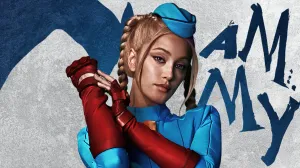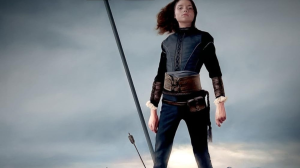Back in 1974, burgeoning filmmaker Brian De Palma wrote and directed a film that managed to blend elements of The Phantom of the Opera, The Portrait of Dorian Grey, and Faust. Not content to deliver audiences just a blend of these iconic storylines, he also enlisted songwriter Paul Williams to turn the project into the rock opera Phantom of the Paradise. Despite the film’s impressive ambition and Rocky Horror Picture Show becoming a massive success by embracing a similar campy, rock opera tone the following year, fans and critics failed to connect with Phantom of the Paradise as strongly, with the picture fading into relative obscurity.
Videos by ComicBook.com
The film marked the debut feature for Jessica Harper, who starred as singer Phoenix who wanted to earn opportunities based purely on her talent, as opposed to her peers doing whatever it took to win over record producer Swan, played by Williams. Luckily, Phoenix caught the eye of a disfigured musician (William Finley) who was haunting the Paradise, a nightclub owned by Swan, the man responsible for the Phantom’s injuries.
Three years after Phantom of the Paradise, Harper starred in Dario Argento’s Suspiria, earning her even more acclaim with genre fans. In the decades since her film debut, Harper has regularly found new ways to explore her creativity, from films to TV to music to cookbooks to podcasts.
To celebrate the 45th anniversary of Phantom of the Paradise, ComicBook.com caught up with Harper to discuss the ambitious endeavor, its legacy, and her future projects.
Initial Reactions
ComicBook.com: Phantom of the Paradise was your first film and it came from writer/director Brian De Palma, so it’s easy to see why you’d be interested in the role based solely on his involvement. What was your first reaction to actually reading the script, given how important the music and visuals were going to be to the final product?
Jessica Harper: That’s a very good question. Originally, when I first saw the script, it was called “Phantom of the Fillmore,” because of the obvious reference to the famous rock palace in San Francisco and in New York. But then ultimately, the Fillmore people wouldn’t allow us to use that title, but I just thought it was the greatest title I ever heard at that point in my life. So that got me intrigued immediately. And then when I understood it was a take on Phantom of the Opera, that intrigued me further. And I knew that Brian was an incredibly talented, brilliant director and Paul Williams was a fabulous songwriter.
Just the elements themselves, I was already sold probably before I even read the script. And it was a funny script. It was hard to imagine, of course, reading it, what it would look like ultimately, but it had a lot of elements that made it irresistible to me.
And Paul Williams was an accomplished musician at the time, but putting his name in the same sentence as “rock opera” would have sounded bizarre at the time.
I know, right? Like, “What?”
But the music is just fantastic and one of the best parts of the movie.
Isn’t it great? I think it’s so fabulous. He wrote one great song after the next. He just really pulled it off, I think the music is fabulous.
Famous Fans

The film kind of defies description. Obviously it has an overall horror narrative, with the play on Phantom of the Opera, but it’s also a comedy, a romance, and a musical. Given how ambitious and unique the film was, were there times on set that you thought it was too absurd to ever be pulled off or were you just that confident in Brian?
I did have that kind of confidence in Brian, for sure. But also, it was so much fun to do, and the music was so good. And everybody was so funny, the guys who played the Juicy Fruits. I mean, all the other bands that they played, and Gerrit Graham, and George Memmoli, everybody was hysterically funny. So I just thought it was all going to be good, funny, fabulous, and obviously, well-directed because of Brian. I guess not everybody, when it opened, not everybody felt the same way, but I thought it was great.
And now, more than 40 years later, you hear filmmakers like Edgar Wright and Guillermo del Toro praising it as one of their favorite films. How does it feel thinking about how the movie struggled to find an audience, only for Academy Award-winning filmmakers to profess their love for it?
I’m very impressed by the attention that this movie has gotten from incredible directors at that level, and also from unique pockets of the population. For example, Winnipeg, Canada is crazy about this movie and have had two or three now, Phantompalooza festivals in the city to celebrate it, one of which I attended. And then there’s a pocket of interest somewhere in Brazil, I can’t remember exactly where, but also in Paris. So there are these unique places and people who just adore this movie, and that makes me very happy that it’s appreciated not only by certain pockets of the population, but also, again, by people like Edgar Wright and Guillermo del Toro.
Even though your average person might not recognize the movie immediately, when you do find someone who is a fan, it feels like you’re members of a secret club in ways that wouldn’t feel as special if it was this huge blockbuster. Looking back, do you wish the film had been a bigger financial hit or are you happy with it having a smaller number of fans who are immensely passionate about it?
Oh, no, I wish it had gotten a wider audience, of course. I mean, that would have been great for everybody involved, and it would have been nice for that movie to have been seen by more people. I’m thrilled that it has this cult status, but yes, it would have been great if it had greater status when it first opened.
Personal Touches
In your audition scene, you do a very specific dance, which you’ve said is improvised, and pieces of your outfit in that scene were your own personal choices as well. Were there any other personal contributions you made to the film along the lines of character moments or pieces of dialogue?
The character did have a natural arc, which I adhered to, and I didn’t change any of the dialogue as far as I can remember. But like in any role, an actor is chosen because of what he or she brings to it, in addition to what’s already in the script. And I was a little cocky and thought I could bring more to it than maybe I should have. For example, making some changes in the wardrobe that I don’t think the costume designer would have been happy with. Like in the final scene, she had a dress designed for me that was very different from what I ultimately wore. All the dance moves and stuff, I threw that in.
Generally, though, the character’s arc was well defined, and I just stuck with it and, of course, trusted Brian to make me look good. I knew at the time, and he’s certainly proved since, that he’s very, very good at getting the performance out of actors that he needs for whatever the project is. He’s a really good actor’s director, I feel.
Unique Experience
Brian would invite you and the rest of the cast to watch the film’s dailies, which is a relatively uncommon thing for a filmmaker to do, but with it being your first film, you likely wouldn’t have known that. As your career advanced, when you looked back at making Phantom, were there other things that stood as being really unconventional? Things that felt either very bizarre or very ambitious and prolific?
Well, again, it was a lot of fun. It was a low-budget film, but I think everybody enjoyed each other. The cast, with the Juicy Fruits, and with Gerrit. There was this group of actors and dancers. And Jack Fisk did the art direction, and his wife, Sissy Spacek, who was not famous yet, was his assistant. It was just a great group of people. I’m trying to remember here, but in my experience, it was uniquely fun and jovial group and also very supportive. William Finley was wonderful as an acting partner, for me. He was very, very supportive and very helpful, especially on that very first day.
Because it was my first movie, I was very nervous and didn’t know much about how to behave on a set, in terms of hitting my marks and finding my light, and all that stuff. So there was, I would say, a unique vibe on that film, and I haven’t had an experience like that since. Although, I’ve had many other wonderful experiences, this just it felt very different.
Contemporary Revival

The film says a lot of interesting things about fandom and celebrity, some of which feel even more relevant now than in 1974. The finale includes a scene where an audience member gets up on stage after worshipping a musician, kills them, and then wields the weapon as if they’re now famous, which feels similar to the blurring lines between fans and celebrity in our culture. Was there much discussion about the film’s bigger themes at the time or were those just afterthoughts?
No, there weren’t that many discussions, as I recall, of larger themes. They were either apparent or not, really. But no, it was pretty straight ahead, “Let’s get this scene shot, please.” When you have limited time and budget, you don’t really have time to sit around talking about larger themes.
And speaking of recently relevance, do you think this film could get a remake or is it so distinctly of its time that you don’t think the magic could come close to being recaptured?
I think nothing is impossible, and it could certainly be remade, or, as with another movie that I was in 40 years ago [Suspiria], not remade exactly, but re-imagined by another director perhaps, that’s possible. There’s also been talk for many years about making a musical, a theater musical, a theatrical performance, a Broadway show, which I think it would be really well-suited for. But it would take, as always, as it always does, it would take a really fantastic director, who thought he or she had the vision to make a different version of the classic and make it worth doing, make it worth making, make it beautiful and interesting.
Future Projects
You had a small part in the Suspiria remake, but director Dario Argento previously spoke out about how he enjoyed the film’s production design, but wasn’t at all a fan of the overall experience. Now that the Suspiria reimagining is out there, were you a fan of the finished product?
I thought it was fantastic. I think Luca Guadagnino is a fantastic director, as we all know, and he really went all out with this. He really had a very powerful vision of how to make his version of this story, and he just really went for it in a way that took a lot of courage, I feel. The movie’s very bold and it’s gorgeous. I think he did an incredible job.
What other projects should your fans be looking out for?
Well, I wanted to tell fans about this project that I completed this year that’s my podcast memoir, which is called “Winnetka,” and that’s the name of the town where I grew up in Illinois. So I would encourage them to look for this podcast. It tells the story about my childhood that’s a little bit dark and a little bit funny. It’s on all platforms, so I would respectfully ask fans to listen to that. And also, I’m appearing in a TV show that Apple is starting to stream. Coming in the fall, they’re having their TV moment. So there’s a show See, which stars Jason Momoa, and I’m going to be showing up in episode six.
So if anybody’s interested in watching that, I think it’s meant to debut sometime in the fall, probably closer to November. So those two projects this year for people to check in with.








